CSR and Decision Making: Integrating Ethics for Business Success
VerifiedAdded on 2021/06/14
|5
|1230
|60
Essay
AI Summary
This essay discusses the importance of Corporate Social Responsibility (CSR) as a model for implementing ethical business decisions, emphasizing its role as a framework for embracing responsibility towards employees, the community, and the environment. It differentiates between business ethics and CSR, highlighting CSR as a component of broader business ethics focused on an organization's impact on the environment, society, and its own prosperity. The author's ethical framework, guided by responsibility towards society, legal compliance, discretionary responsibility, and economic considerations, is applied to business through stakeholder engagement, shared value creation, and ethical leadership. Personal experiences illustrate the challenges and applications of these principles in professional life, including balancing stakeholder interests and maintaining ethical objectivity. The essay concludes by reflecting on the author's approach to ethical decision-making, acknowledging a blend of universal and situational ethics while striving to prioritize both shareholder value and ethical conduct.
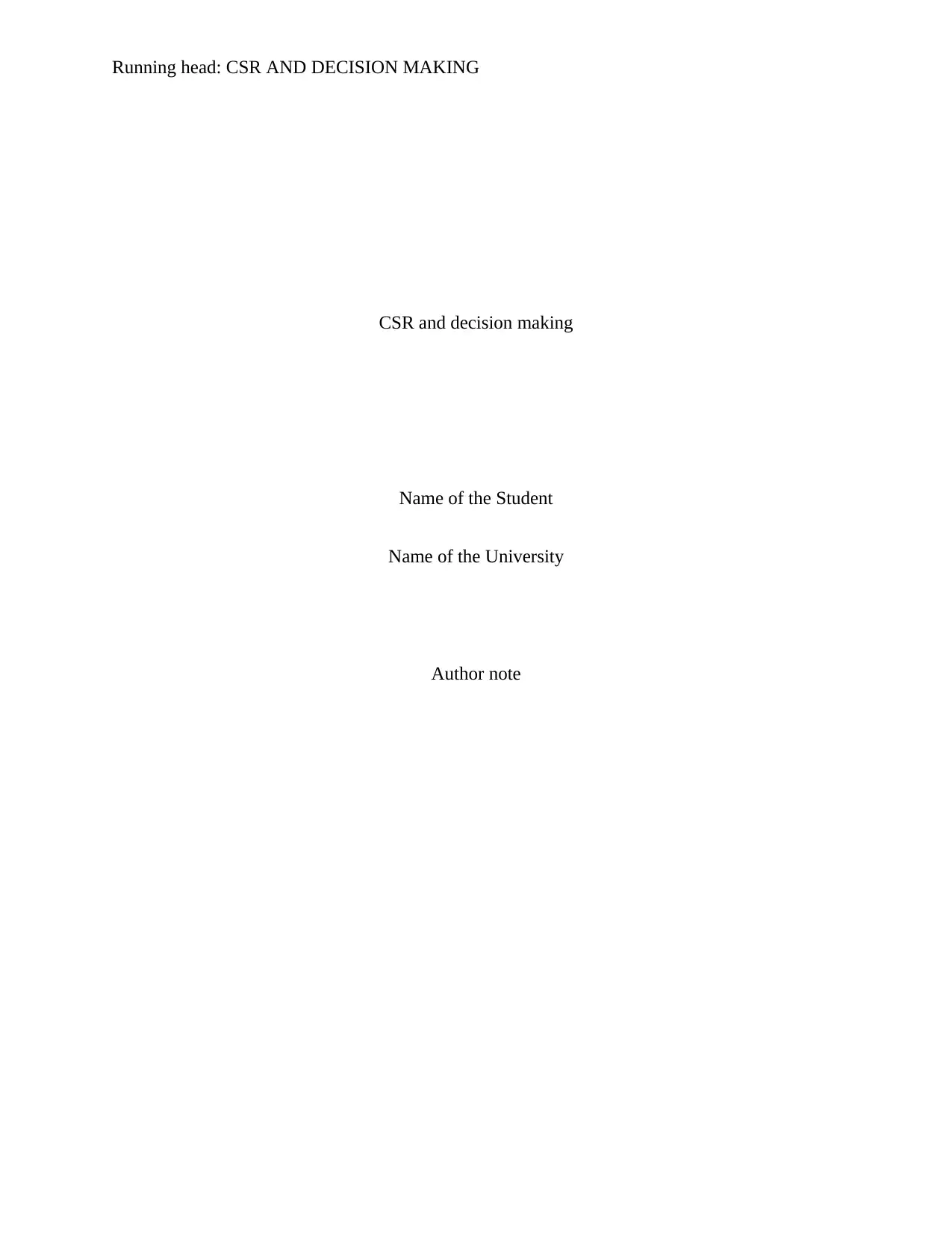
Running head: CSR AND DECISION MAKING
CSR and decision making
Name of the Student
Name of the University
Author note
CSR and decision making
Name of the Student
Name of the University
Author note
Paraphrase This Document
Need a fresh take? Get an instant paraphrase of this document with our AI Paraphraser
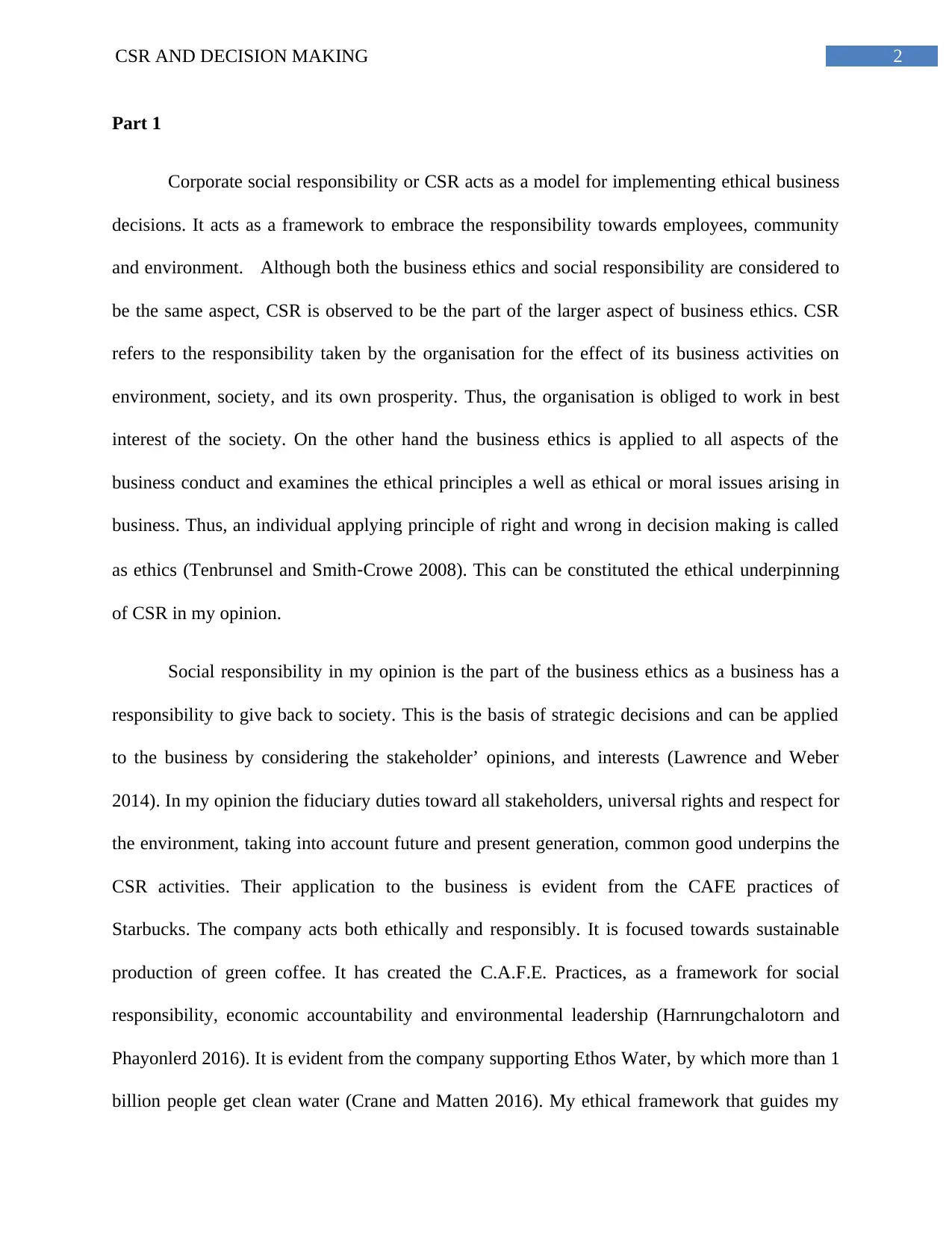
2CSR AND DECISION MAKING
Part 1
Corporate social responsibility or CSR acts as a model for implementing ethical business
decisions. It acts as a framework to embrace the responsibility towards employees, community
and environment. Although both the business ethics and social responsibility are considered to
be the same aspect, CSR is observed to be the part of the larger aspect of business ethics. CSR
refers to the responsibility taken by the organisation for the effect of its business activities on
environment, society, and its own prosperity. Thus, the organisation is obliged to work in best
interest of the society. On the other hand the business ethics is applied to all aspects of the
business conduct and examines the ethical principles a well as ethical or moral issues arising in
business. Thus, an individual applying principle of right and wrong in decision making is called
as ethics (Tenbrunsel and Smith‐Crowe 2008). This can be constituted the ethical underpinning
of CSR in my opinion.
Social responsibility in my opinion is the part of the business ethics as a business has a
responsibility to give back to society. This is the basis of strategic decisions and can be applied
to the business by considering the stakeholder’ opinions, and interests (Lawrence and Weber
2014). In my opinion the fiduciary duties toward all stakeholders, universal rights and respect for
the environment, taking into account future and present generation, common good underpins the
CSR activities. Their application to the business is evident from the CAFE practices of
Starbucks. The company acts both ethically and responsibly. It is focused towards sustainable
production of green coffee. It has created the C.A.F.E. Practices, as a framework for social
responsibility, economic accountability and environmental leadership (Harnrungchalotorn and
Phayonlerd 2016). It is evident from the company supporting Ethos Water, by which more than 1
billion people get clean water (Crane and Matten 2016). My ethical framework that guides my
Part 1
Corporate social responsibility or CSR acts as a model for implementing ethical business
decisions. It acts as a framework to embrace the responsibility towards employees, community
and environment. Although both the business ethics and social responsibility are considered to
be the same aspect, CSR is observed to be the part of the larger aspect of business ethics. CSR
refers to the responsibility taken by the organisation for the effect of its business activities on
environment, society, and its own prosperity. Thus, the organisation is obliged to work in best
interest of the society. On the other hand the business ethics is applied to all aspects of the
business conduct and examines the ethical principles a well as ethical or moral issues arising in
business. Thus, an individual applying principle of right and wrong in decision making is called
as ethics (Tenbrunsel and Smith‐Crowe 2008). This can be constituted the ethical underpinning
of CSR in my opinion.
Social responsibility in my opinion is the part of the business ethics as a business has a
responsibility to give back to society. This is the basis of strategic decisions and can be applied
to the business by considering the stakeholder’ opinions, and interests (Lawrence and Weber
2014). In my opinion the fiduciary duties toward all stakeholders, universal rights and respect for
the environment, taking into account future and present generation, common good underpins the
CSR activities. Their application to the business is evident from the CAFE practices of
Starbucks. The company acts both ethically and responsibly. It is focused towards sustainable
production of green coffee. It has created the C.A.F.E. Practices, as a framework for social
responsibility, economic accountability and environmental leadership (Harnrungchalotorn and
Phayonlerd 2016). It is evident from the company supporting Ethos Water, by which more than 1
billion people get clean water (Crane and Matten 2016). My ethical framework that guides my
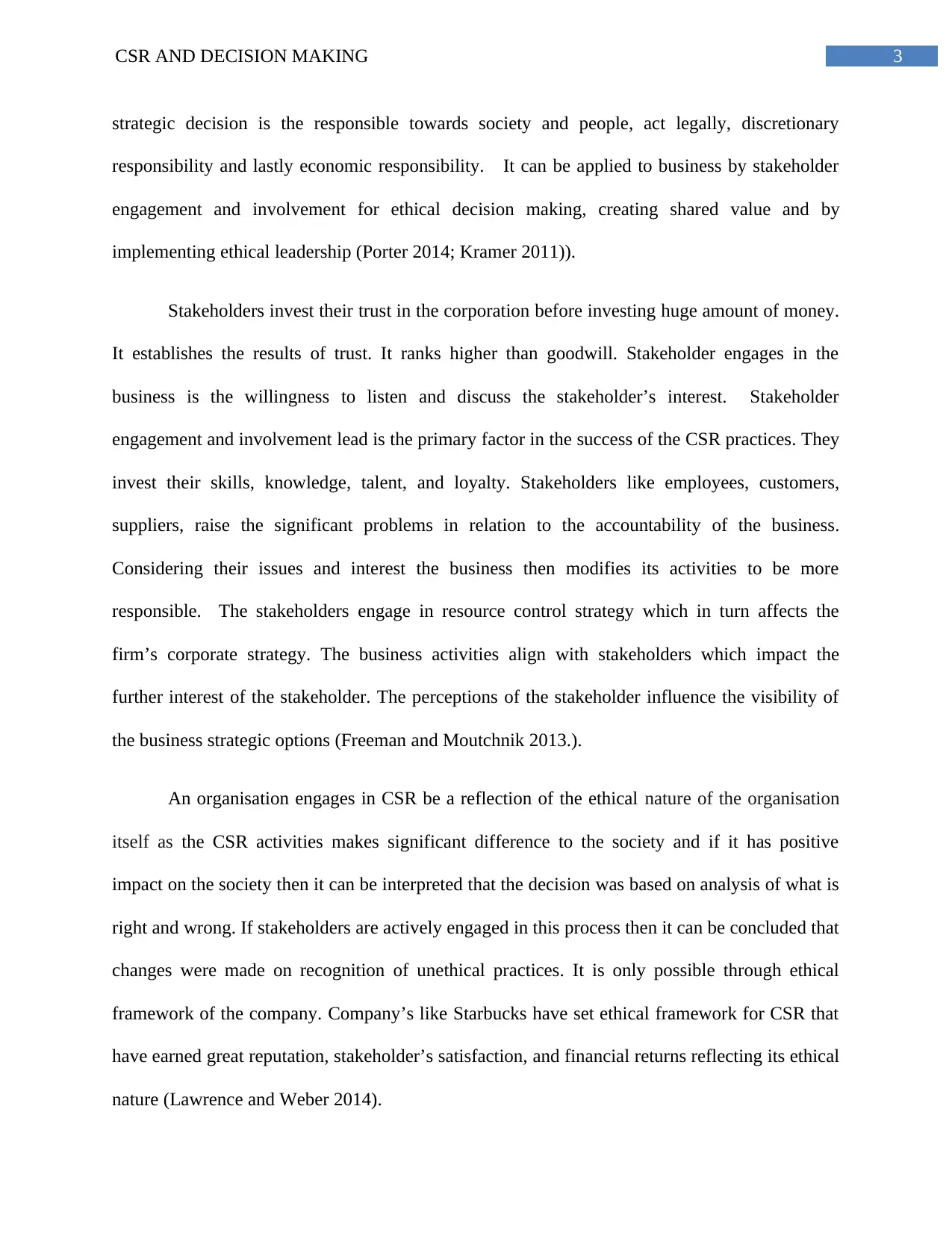
3CSR AND DECISION MAKING
strategic decision is the responsible towards society and people, act legally, discretionary
responsibility and lastly economic responsibility. It can be applied to business by stakeholder
engagement and involvement for ethical decision making, creating shared value and by
implementing ethical leadership (Porter 2014; Kramer 2011)).
Stakeholders invest their trust in the corporation before investing huge amount of money.
It establishes the results of trust. It ranks higher than goodwill. Stakeholder engages in the
business is the willingness to listen and discuss the stakeholder’s interest. Stakeholder
engagement and involvement lead is the primary factor in the success of the CSR practices. They
invest their skills, knowledge, talent, and loyalty. Stakeholders like employees, customers,
suppliers, raise the significant problems in relation to the accountability of the business.
Considering their issues and interest the business then modifies its activities to be more
responsible. The stakeholders engage in resource control strategy which in turn affects the
firm’s corporate strategy. The business activities align with stakeholders which impact the
further interest of the stakeholder. The perceptions of the stakeholder influence the visibility of
the business strategic options (Freeman and Moutchnik 2013.).
An organisation engages in CSR be a reflection of the ethical nature of the organisation
itself as the CSR activities makes significant difference to the society and if it has positive
impact on the society then it can be interpreted that the decision was based on analysis of what is
right and wrong. If stakeholders are actively engaged in this process then it can be concluded that
changes were made on recognition of unethical practices. It is only possible through ethical
framework of the company. Company’s like Starbucks have set ethical framework for CSR that
have earned great reputation, stakeholder’s satisfaction, and financial returns reflecting its ethical
nature (Lawrence and Weber 2014).
strategic decision is the responsible towards society and people, act legally, discretionary
responsibility and lastly economic responsibility. It can be applied to business by stakeholder
engagement and involvement for ethical decision making, creating shared value and by
implementing ethical leadership (Porter 2014; Kramer 2011)).
Stakeholders invest their trust in the corporation before investing huge amount of money.
It establishes the results of trust. It ranks higher than goodwill. Stakeholder engages in the
business is the willingness to listen and discuss the stakeholder’s interest. Stakeholder
engagement and involvement lead is the primary factor in the success of the CSR practices. They
invest their skills, knowledge, talent, and loyalty. Stakeholders like employees, customers,
suppliers, raise the significant problems in relation to the accountability of the business.
Considering their issues and interest the business then modifies its activities to be more
responsible. The stakeholders engage in resource control strategy which in turn affects the
firm’s corporate strategy. The business activities align with stakeholders which impact the
further interest of the stakeholder. The perceptions of the stakeholder influence the visibility of
the business strategic options (Freeman and Moutchnik 2013.).
An organisation engages in CSR be a reflection of the ethical nature of the organisation
itself as the CSR activities makes significant difference to the society and if it has positive
impact on the society then it can be interpreted that the decision was based on analysis of what is
right and wrong. If stakeholders are actively engaged in this process then it can be concluded that
changes were made on recognition of unethical practices. It is only possible through ethical
framework of the company. Company’s like Starbucks have set ethical framework for CSR that
have earned great reputation, stakeholder’s satisfaction, and financial returns reflecting its ethical
nature (Lawrence and Weber 2014).
⊘ This is a preview!⊘
Do you want full access?
Subscribe today to unlock all pages.

Trusted by 1+ million students worldwide
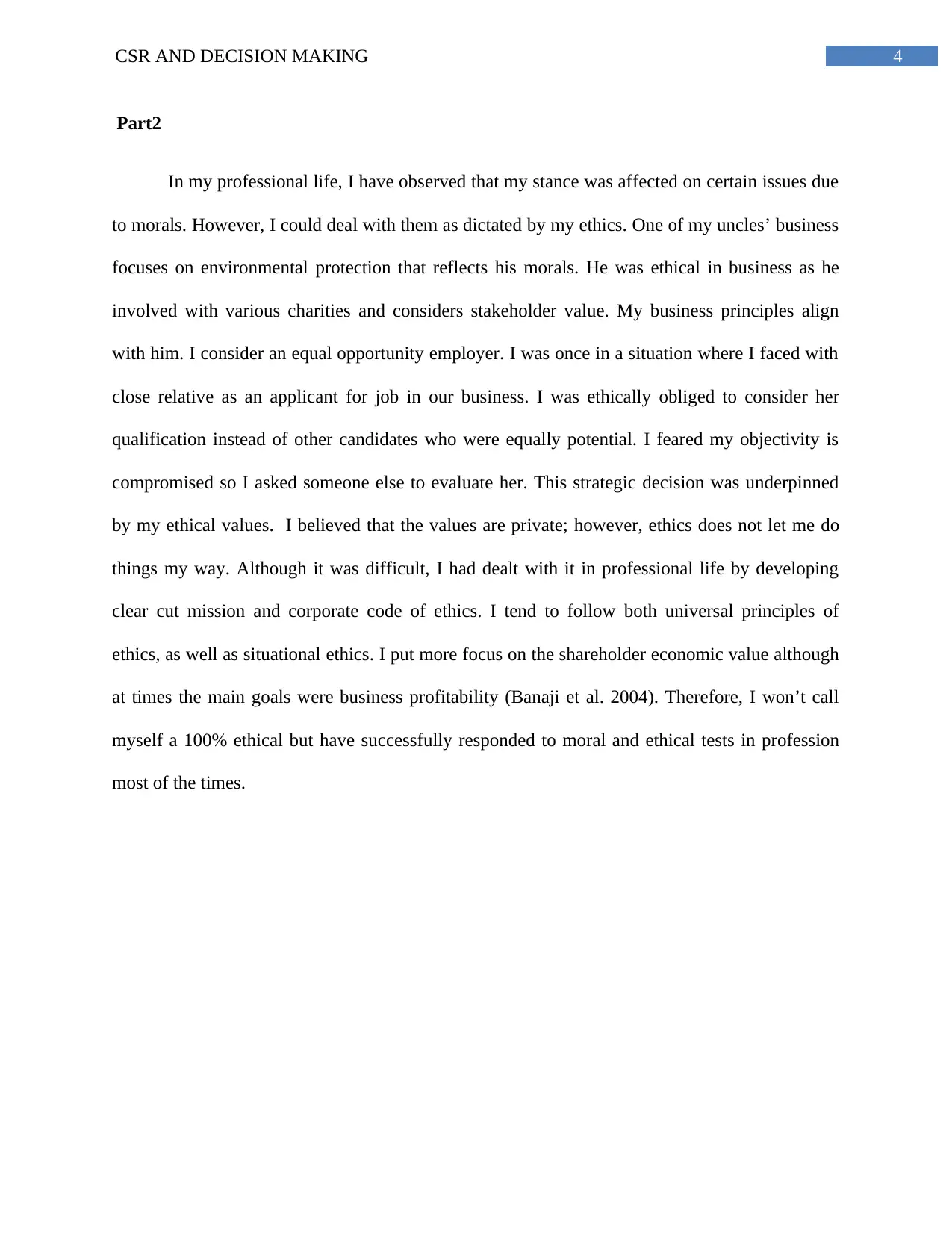
4CSR AND DECISION MAKING
Part2
In my professional life, I have observed that my stance was affected on certain issues due
to morals. However, I could deal with them as dictated by my ethics. One of my uncles’ business
focuses on environmental protection that reflects his morals. He was ethical in business as he
involved with various charities and considers stakeholder value. My business principles align
with him. I consider an equal opportunity employer. I was once in a situation where I faced with
close relative as an applicant for job in our business. I was ethically obliged to consider her
qualification instead of other candidates who were equally potential. I feared my objectivity is
compromised so I asked someone else to evaluate her. This strategic decision was underpinned
by my ethical values. I believed that the values are private; however, ethics does not let me do
things my way. Although it was difficult, I had dealt with it in professional life by developing
clear cut mission and corporate code of ethics. I tend to follow both universal principles of
ethics, as well as situational ethics. I put more focus on the shareholder economic value although
at times the main goals were business profitability (Banaji et al. 2004). Therefore, I won’t call
myself a 100% ethical but have successfully responded to moral and ethical tests in profession
most of the times.
Part2
In my professional life, I have observed that my stance was affected on certain issues due
to morals. However, I could deal with them as dictated by my ethics. One of my uncles’ business
focuses on environmental protection that reflects his morals. He was ethical in business as he
involved with various charities and considers stakeholder value. My business principles align
with him. I consider an equal opportunity employer. I was once in a situation where I faced with
close relative as an applicant for job in our business. I was ethically obliged to consider her
qualification instead of other candidates who were equally potential. I feared my objectivity is
compromised so I asked someone else to evaluate her. This strategic decision was underpinned
by my ethical values. I believed that the values are private; however, ethics does not let me do
things my way. Although it was difficult, I had dealt with it in professional life by developing
clear cut mission and corporate code of ethics. I tend to follow both universal principles of
ethics, as well as situational ethics. I put more focus on the shareholder economic value although
at times the main goals were business profitability (Banaji et al. 2004). Therefore, I won’t call
myself a 100% ethical but have successfully responded to moral and ethical tests in profession
most of the times.
Paraphrase This Document
Need a fresh take? Get an instant paraphrase of this document with our AI Paraphraser
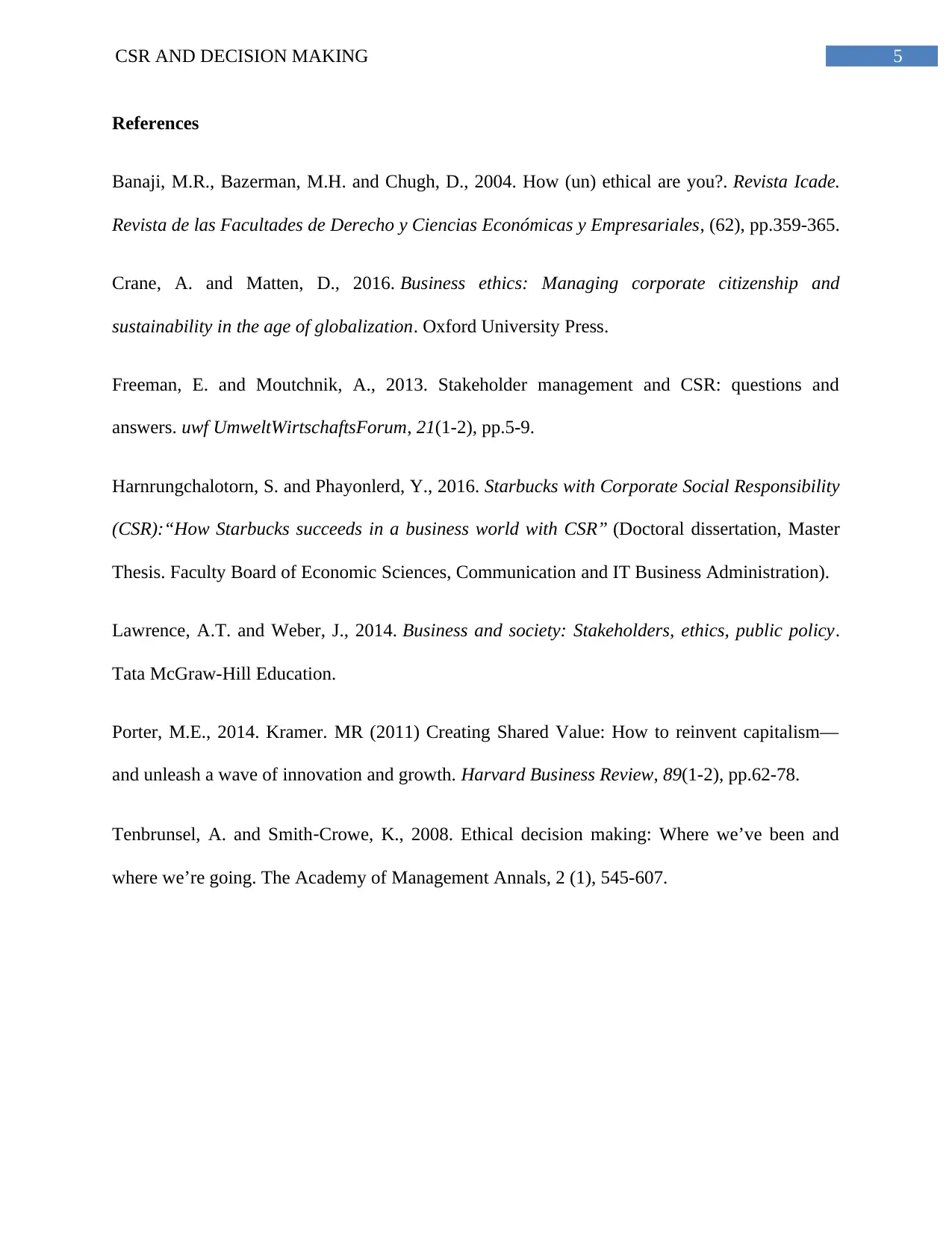
5CSR AND DECISION MAKING
References
Banaji, M.R., Bazerman, M.H. and Chugh, D., 2004. How (un) ethical are you?. Revista Icade.
Revista de las Facultades de Derecho y Ciencias Económicas y Empresariales, (62), pp.359-365.
Crane, A. and Matten, D., 2016. Business ethics: Managing corporate citizenship and
sustainability in the age of globalization. Oxford University Press.
Freeman, E. and Moutchnik, A., 2013. Stakeholder management and CSR: questions and
answers. uwf UmweltWirtschaftsForum, 21(1-2), pp.5-9.
Harnrungchalotorn, S. and Phayonlerd, Y., 2016. Starbucks with Corporate Social Responsibility
(CSR):“How Starbucks succeeds in a business world with CSR” (Doctoral dissertation, Master
Thesis. Faculty Board of Economic Sciences, Communication and IT Business Administration).
Lawrence, A.T. and Weber, J., 2014. Business and society: Stakeholders, ethics, public policy.
Tata McGraw-Hill Education.
Porter, M.E., 2014. Kramer. MR (2011) Creating Shared Value: How to reinvent capitalism—
and unleash a wave of innovation and growth. Harvard Business Review, 89(1-2), pp.62-78.
Tenbrunsel, A. and Smith‐Crowe, K., 2008. Ethical decision making: Where we’ve been and
where we’re going. The Academy of Management Annals, 2 (1), 545-607.
References
Banaji, M.R., Bazerman, M.H. and Chugh, D., 2004. How (un) ethical are you?. Revista Icade.
Revista de las Facultades de Derecho y Ciencias Económicas y Empresariales, (62), pp.359-365.
Crane, A. and Matten, D., 2016. Business ethics: Managing corporate citizenship and
sustainability in the age of globalization. Oxford University Press.
Freeman, E. and Moutchnik, A., 2013. Stakeholder management and CSR: questions and
answers. uwf UmweltWirtschaftsForum, 21(1-2), pp.5-9.
Harnrungchalotorn, S. and Phayonlerd, Y., 2016. Starbucks with Corporate Social Responsibility
(CSR):“How Starbucks succeeds in a business world with CSR” (Doctoral dissertation, Master
Thesis. Faculty Board of Economic Sciences, Communication and IT Business Administration).
Lawrence, A.T. and Weber, J., 2014. Business and society: Stakeholders, ethics, public policy.
Tata McGraw-Hill Education.
Porter, M.E., 2014. Kramer. MR (2011) Creating Shared Value: How to reinvent capitalism—
and unleash a wave of innovation and growth. Harvard Business Review, 89(1-2), pp.62-78.
Tenbrunsel, A. and Smith‐Crowe, K., 2008. Ethical decision making: Where we’ve been and
where we’re going. The Academy of Management Annals, 2 (1), 545-607.
1 out of 5
Related Documents
Your All-in-One AI-Powered Toolkit for Academic Success.
+13062052269
info@desklib.com
Available 24*7 on WhatsApp / Email
![[object Object]](/_next/static/media/star-bottom.7253800d.svg)
Unlock your academic potential
Copyright © 2020–2026 A2Z Services. All Rights Reserved. Developed and managed by ZUCOL.




